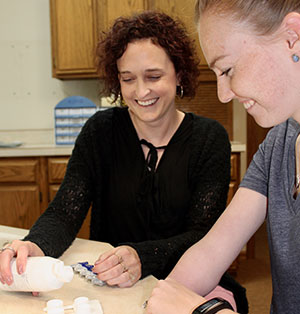Contact Lenses


The fast pace at which contact lens materials are coming to market can be confusing to the consumer. It is hard to separate facts from hype for anyone not directly involved and educated in the field. This section should help clear up misconceptions.
The main categories of contacts are soft and rigid. Each of these has many types and applications. Spherical lenses correct nearsightedness or farsightedness. Toric lenses correct astigmatism.
Soft Contact Lenses
Soft lenses are most popular due to increased comfort and wearing time. The soft flexible nature of these materials may lead to unsatisfactory acuity for some people. Also the porous nature of soft lenses can lead to accumulation of deposits from the tear chemistry of the eye. These deposits from the tear chemistry of the eye lead to eye infections; therefore, multi-packaged lenses that are replaced on a regular basis have largely eliminated these problems. Virtually all the patients at My Family Vision Clinic have this type of lens which results in clearer vision and healthier eyes.
The first soft lenses that give less than satisfactory acuity have been replaced with new designs including lenses to correct astigmatism. These soft toric lenses give much sharper, clearer vision to patients with residual astigmatism, who have previously been fitted with spherical lenses.
Extended Wear Lenses
Some soft lens materials are oxygen permeable enough to be worn during sleep. These are called extended wear lenses. The life span of a daily wear lens (taken out and stored overnight) is longer than an extended wear lens. Patients wearing extended wear lenses need to be seen more frequently to monitor eye health.
Also available are lenses that are worn one full day and then discarded before sleep. This eliminates problems with storage solution reactions that some patients experience. These lenses can be also be worn on a very intermitted schedule such as weekend sports, etc. Due to new manufacturing technology these are affordable for many people.
Rigid Lenses
Rigid lenses, also known as gas permeable, are made of materials that are much improved in oxygen permeability. Some prescriptions are best corrected with these materials. After the initial period of adjustment to lens wear many people find this type of lens gives them sharp crisp vision. Some rigid materials are permeable enough that they can be worn as extended wear.
Bifocal Lenses
Both rigid and soft lenses are available to correct some prescriptions requiring bifocals. The technology of this type of lens is improving all the time allowing more people the freedom of good vision without wearing glasses.
If you have questions or concerns about contacts you are currently wearing or have never worn contacts make an appointment with us. You may benefit from new technology. At My Family Vision Clinic we let you “test drive” lenses with your prescription any time you have a contact lens examination. This means you can try the experience of wearing contacts out of the office without financial risk. When you return for your progress exam the doctor can evaluate and discuss with you your suitability to wear contact lenses on a long term basis.
McCook Office Hours
- Monday
- 8:00am - 5:00pm
- Tuesday
- 8:00am - 5:00pm
- Wednesday
- 8:00am - 5:00pm
- Thursday
- 8:00am - 5:00pm
- Friday
- 8:00am - 4:00pm
- Saturday
- Closed
- Sunday
- Closed
Benkelman Office Hours
- Monday
- 8:00am - 5:00pm
- Tuesday
- 8:00am - 5:00pm
- Wednesday
- 8:00am - 5:00pm
- Thursday
- Closed
- Friday
- Closed
- Saturday
- Closed
- Sunday
- Closed
